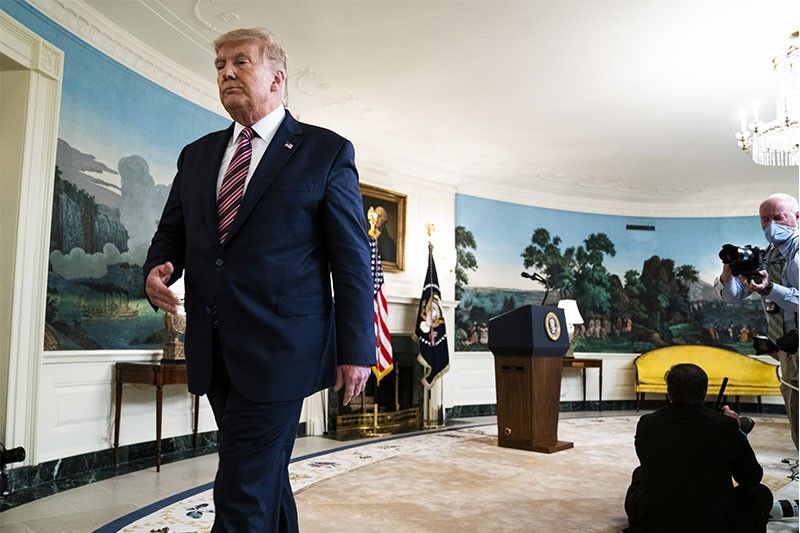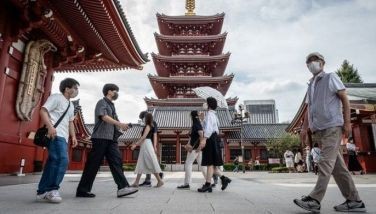Trump admitted playing down coronavirus danger

WASHINGTON, United States — US President Donald Trump admits he tried to minimize the seriousness of the threat from Covid-19 at the outset of the pandemic in audio recordings released Wednesday from interviews with veteran US journalist Bob Woodward.
"I wanted to always play it down," Trump said in an interview with Woodward on March 19, according to a CNN preview of the book "Rage," due to be published September 15.
"I still like playing it down, because I don't want to create a panic," he said in the conversation with Woodward, which was recorded.
Coming eight weeks before the November 3 presidential election, the revelation added new pressure on Trump. Opinion polls show around two thirds of Americans disapprove of his handling of the virus and he has often been accused of minimizing the crisis in order to try and boost his reelection chances.
Speaking to reporters at the White House, Trump denounced the book as "another political hit job" and said if he'd downplayed Covid-19 it was to prevent a "frenzy."
"The fact is I'm a cheerleader for this country, I love this country and I don't want people to be frightened," he said.
"I'm not going to drive this country or the world into a frenzy," he said. "We have to show leadership and the last thing you want to do is create a panic."
However, "Rage" will give fresh ammunition to the Democrats arguing that Trump failed to prepare Americans for the severity of the coronavirus outbreak or to lead them into a proper response.
In the interviews with Woodward, Trump made clear he'd understood at the outset that the virus was "deadly stuff" -- far more dangerous than the ordinary flu.
In public, however, Trump repeatedly told Americans during the initial weeks at the start of 2020 that the virus wasn't dangerous and would "disappear" by itself.
"He knew how deadly it was," Democratic presidential challenger Joe Biden said while campaigning in Michigan. "He lied to the American people. He knowingly and willingly lied about the threat it posed to the country for months."
"It was a life and death betrayal of the American people," Biden added.
But there was support for Trump from the highly respected infectious diseases expert Anthony Fauci, who has consistently told the public that the coronavirus requires a tough response -- even when the president appeared to be saying something different.
"I don't recall anything that was any gross distortion in things that I spoke to him about," he told Fox News.
Trump was keen to stop the country from getting "down and out," Fauci said.
Mixed messages
The US death toll from Covid-19 is expected soon to pass 200,000.
The president has repeatedly insisted that he has successfully managed the pandemic, which is soon on track to take 200,000 lives in the country.
He points to early decisions to ban travel from China, where the virus first appeared, and from hotspots in Europe.
However, at minimum Trump delivered mixed messages at a time when the country was looking for guidance.
He veered from declaring himself the equivalent of a war-time president to contradicting government scientists and calling for early reopening of the economy.
In February -- well after he had been briefed by advisors on the dangers posed by the coronavirus -- he said that the virus might go away by April "with the heat."
In March, he described the government's "tremendous control over" the situation and said: "It will go away. Just stay calm."
That same month, Trump compared the coronavirus to the common flu, which he noted kills "between 27,000 and 70,000 per year" yet "nothing is shut down, life & the economy go on."
At the end of March, a grim-faced president announced that a death toll of 100,000 was looming. Shortly before, he'd been talking up the idea of people ending social distancing in time for Easter in mid-April.
It took until July before Trump even wore a face mask in public. Early on, he also frequently praised the Chinese government's response, only later pivoting to ferociously blaming Beijing for the global health crisis.
Follow this page for updates on a mysterious pneumonia outbreak that has struck dozens of people in China.
New Zealand Prime Minister Chris Hipkins says on Sunday that he had contracted COVID-19, testing positive at a key point in his flailing campaign for re-election.
Hipkins saYS on his official social media feed that he would need to isolate for up to five days -- less than two weeks before his country's general election.
The leader of the centre-left Labour Party said he started to experience cold symptoms on Saturday and had cancelled most of his weekend engagements. — AFP
The World Health Organization and US health authorities say Friday they are closely monitoring a new variant of COVID-19, although the potential impact of BA.2.86 is currently unknown.
The WHO classified the new variant as one under surveillance "due to the large number (more than 30) of spike gene mutations it carries", it wrote in a bulletin about the pandemic late Thursday.
So far, the variant has only been detected in Israel, Denmark and the United States. — AFP
The World Health Organization says on Friday that the number of new COVID-19 cases reported worldwide rose by 80% in the last month, days after designating a new "variant of interest".
The WHO declared in May that Covid is no longer a global health emergency, but has warned that the virus will continue to circulate and mutate, causing occasional spikes in infections, hospitalisations and deaths.
In its weekly update, the UN agency said that nations reported nearly 1.5 million new cases from July 10 to August 6, an 80% increase compared to the previous 28 days. — AFP
The head of US intelligence says that there was no evidence that the COVID-19 virus was created in the Chinese government's Wuhan research lab.
In a declassified report, the Office of the Director of National Intelligence (ODNI) says they had no information backing recent claims that three scientists at the lab were some of the very first infected with COVID-19 and may have created the virus themselves.
Drawing on intelligence collected by various member agencies of the US intelligence community (IC), the ODNI report says some scientists at the Wuhan lab had done genetic engineering of coronaviruses similar to COVID-19. — AFP
Boris Johnson deliberately misled MPs over Covid lockdown-breaking parties in Downing Street when he was prime minister, a UK parliament committee ruled on Thursday.
The cross-party Privileges Committee said Johnson, 58, would have been suspended as an MP for 90 days for "repeated contempts (of parliament) and for seeking to undermine the parliamentary process".
But he avoided any formal sanction by his peers in the House of Commons by resigning as an MP last week.
In his resignation statement last Friday, Johnson pre-empted publication of the committee's conclusions, claiming a political stitch-up, even though the body has a majority from his own party.
He was unrepentant again on Thursday, accusing the committee of being "anti-democratic... to bring about what is intended to be the final knife-thrust in a protracted political assassination".
Calling it "beneath contempt", he said it was "for the people of this to decide who sits in parliament, not Harriet Harman", the veteran opposition Labour MP who chaired the seven-person committee. — AFP
- Latest
- Trending





























